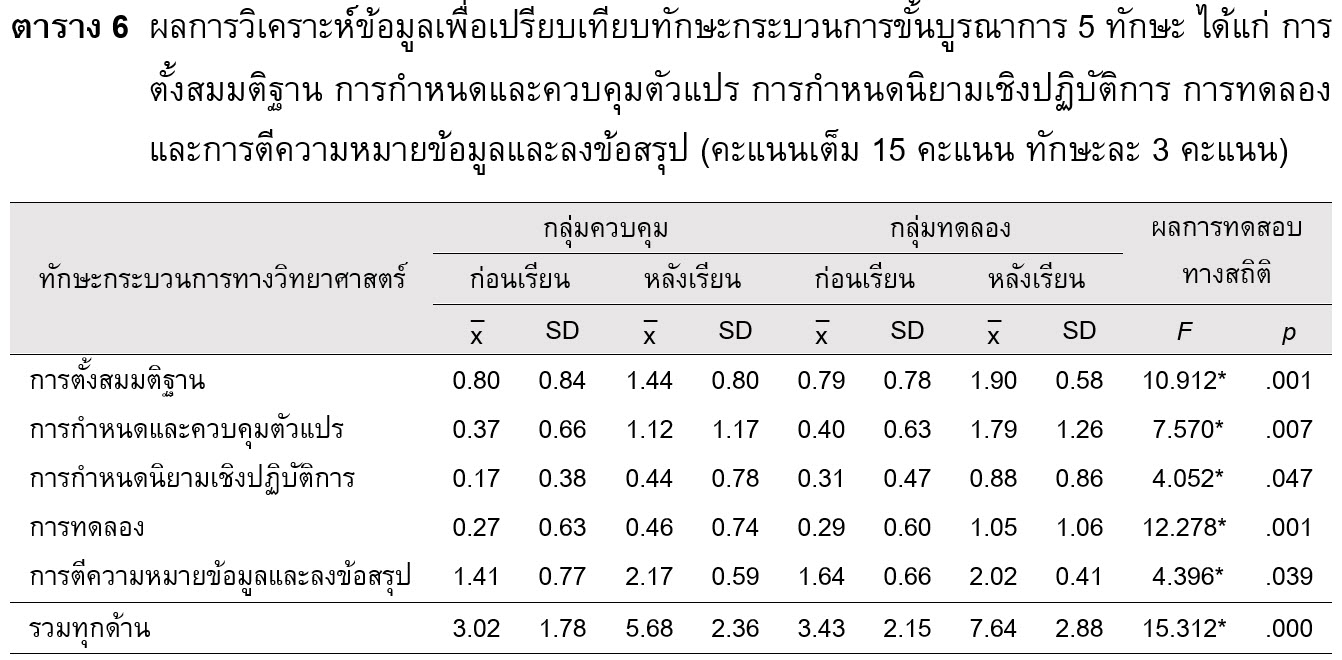การเปรียบเทียบผลสัมฤทธิ์ทางการเรียนและทักษะกระบวนการทางวิทยาศาสตร์ขั้นบูรณาการ เรื่อง ระบบประสาท ของนักเรียนชั้นมัธยมศึกษาปีที่ 4 โดยการจัดการเรียนรู้แบบสืบเสาะหาความรู้ร่วมกับการใช้แผนผังรูปตัววี และการจัดการเรียนรู้แบบปกติ
Main Article Content
Abstract
Mariam Watthanard, Chade Sirisawat and Sutin Kingtong
รับบทความ: 29 มิถุนายน 2559; ยอมรับตีพิมพ์: 12 ตุลาคม 2559
บทคัดย่อ
การวิจัยนี้มีวัตถุประสงค์เพื่อเปรียบเทียบ 1) ผลสัมฤทธิ์ทางการเรียน และ 2) ทักษะกระบวนการทางวิทยาศาสตร์ขั้นบูรณาการของนักเรียนชั้นมัธยมศึกษาปีที่ 4 โดยการจัดการเรียนรู้แบบสืบเสาะหาความรู้ร่วมกับการใช้แผนผังรูปตัววีเทียบกับการจัดการเรียนรู้แบบปกติ กลุ่มที่ศึกษาในการวิจัยครั้งนี้ ได้แก่ นักเรียนโครงการพัฒนาและส่งเสริมผู้มีความสามารถพิเศษทางวิทยาศาสตร์และคณิตศาสตร์ ชั้นมัธยมศึกษาปีที่ 4 โรงเรียนมัธยมศึกษาแห่งหนึ่งในจังหวัดสงขลา จำนวน 83 คน แบ่ง เป็นกลุ่มทดลอง จำนวน 42 คน ได้รับการจัดการเรียนรู้แบบสืบเสาะหาความรู้ร่วมกับการใช้แผนผังรูปตัววี และกลุ่มควบคุม จำนวน 41 คน ได้รับการจัดการเรียนรู้แบบปกติ เรื่อง ระบบประสาท การวิจัยครั้งนี้เป็นการวิจัยเชิงทดลอง เก็บรวบรวมข้อมูลโดยใช้แบบทดสอบวัดผลสัมฤทธิ์ทางการเรียน และแบบทดสอบวัดทักษะกระบวนการทางวิทยาศาสตร์ขั้นบูรณาการ วิเคราะห์ข้อมูลโดยใช้สถิติ ANCOVA ผลการวิจัยพบว่า ผลสัมฤทธิ์ทางการเรียนของนักเรียนกลุ่มทดลองสูงกว่ากลุ่มควบคุม (p < .05) เมื่อพิจารณารายด้าน พบว่า ผลสัมฤทธิ์ทางการเรียน ด้านความเข้าใจ การนำไปใช้ การวิเคราะห์ การสังเคราะห์ และการประเมินค่า ของนักเรียนของนักเรียนกลุ่มทดลองสูงกว่า (p < .05) ยกเว้นด้านความรู้ความจำที่ไม่แตกต่างกัน (p > .05) และทักษะกระบวนการทางวิทยาศาสตร์ขั้นบูรณาการของนักเรียนของนักเรียนกลุ่มทดลองสูงกว่ากลุ่มควบคุม (p < .05) เมื่อพิจารณารายทักษะ พบว่า มี 4 ทักษะ ได้แก่ การตั้งสมมติฐาน การกำหนดและควบคุมตัวแปร การกำหนดนิยามเชิงปฏิบัติการ และการทดลองของนักเรียนกลุ่มทดลองสูงกว่ากลุ่มควบคุม (p < .05) ยกเว้นทักษะการตีความหมายข้อมูลและลงข้อสรุปที่ต่ำกว่า แสดงให้เห็นว่า การสอนแบบสืบเสาะหาความรู้ร่วมกับการใช้แผนผังรูปตัววีสามารถพัฒนาผลสัมฤทธิ์ทางการเรียนและทักษะกระบวนการทางวิทยาศาสตร์ขั้นบูรณาการได้
คำสำคัญ: การสืบเสาะหาความรู้ แผนผังรูปตัววี ทักษะกระบวนการทางวิทยาศาสตร์ขั้นบูรณาการ
Abstract
The purpose of this research was to compare 1) learning achievement and 2) integrated science process skill of 10th grade students after using the combination of inquiry-based learning with Vee diagram, comparing to the conventional learning method. Study groups were 10th grade students who enrolled in Science and Math Gifted program of a School in Songkhla. A total number of 83 participants was divided into 2 groups including experimental (N = 42) and control (N = 41) groups. The experimental group was learned by using the inquiry-based learning with Vee diagram, while the control group was learned by the conventional method in the topic of nervous system. This research was experimental design. The data were collected by using Learning Achievement Test and Integrated Science Process Skill Test. The data were statistically analyzed by using the ANCOVA. The results showed that learning achievement of the experimental group was higher than that of the control group (p < .05). When considered based on learning achievement domains, results revealed that achievement of comprehension, application, analysis, synthesis and evaluation domains of the experimental group were higher than those of the control group (p < .05), except knowledge domain with no difference (p > .05). Integrated science process skills of the experimental group were higher than those of the control group (p < .05). When considered based on each domain of integrated science process skills, results revealed that the skills of formulating hypotheses, defining operation, identifying and controlling variable and experimenting of experimental group were higher than those of the control group (p < .05), except data interpretation domain with less than the control group. The results indicated that the inquiry-based learning with Vee diagram can improve the learning achievement and integrated science process skills of experimental group.
Keywords: Inquiry, Vee diagram, Integrated science process skill
Downloads
Article Details

This work is licensed under a Creative Commons Attribution-NonCommercial 4.0 International License.
References
Chareesan, C. (2012). Understanding of Scientific Concepts about Life and the Environment of 9th Grade Students by Using Vee Diagram Learning Management. Master of Education Thesis, Khon Kaen: Khon Kaen University. (in Thai)
Institute for the Promotion of Teaching Science and Technology (IPST). (2012). Science Teacher Professional Approach to Effectiveness Teaching. Bangkok: Intereducation Supply. (in Thai)
Institute for the Promotion of Teaching Science and Technology (IPST). (2008). 36 Years of the Institute for Promotion of Teaching Science and Technology. Bangkok: Author. (in Thai)
Kammanee, T. (2014). Teaching Method: Knowledge to the Effective Learning Process. 18th ed. Bangkok: Dansuthakarnpim. (in Thai)
Kingmali, P. (2009). The Development of an Integrated Science Process Skills of Grade 8th Students Using the Inquiry Method. Master of Education Thesis. Petchaburi: Phetchaburi Rajabhat University. (in Thai)
Lauhapaiboon, P. (1999). Guidelines for Science Teaching (revised). Bangkok: Thaiwatanapanit. (in Thai)
Lin, J. L., Cheng M. F., Chang, Y. C., Li, H. W., Chang, J. Y., and Lin, D. M. (2014). Learning activities that combine science magic activities with the 5E instructional model to influence secondary-school students’ attitudes to science. Eurasia Journal of Mathematics, Science & Technology Education 10(5): 415–426.
Phornphisutthimas, S. (2008) Teaching science through process skills. Advanced Science 8(2): 28–38. (in Thai)
Phornphisutthimas, S. (2013). Learning management of science in 21st Century. Journal of Research Unit on Science, Technology and Environment for Learning 4(1): 55–63. (in Thai)
Pornkul, C. (2014). Teaching Thinking: Theory and Application. Bangkok: Chulalongkorn University. (in Thai)
Saiyot, L., and Saiyot, A. (2000). Techniques for Measuring Learning. 2nd ed. Bangkok: Suriyasasn. (in Thai)
Senamontree, M. (1999). Comparison of Achievement and Science Process Skills of Green Earth Topic in Science Subject of Grade 7th Students between Using Vee diagram Teaching and Conventional Teaching. Master of Education Thesis. Khon Kaen: Khon Kaen University. (in Thai)
Suksawad, U. (2013). The Effect of Using Science Learning Activities in Heredity by 7E Learning Cycle Mixed Storyline Teaching of Matthayomsuksa III Student. Master of Education Thesis. Chonburi: Bura-pha University. (in Thai)
Suriyawong, S., Ruangsri, S., and Setthawong, P. (2011). Research Methods in Education. 2nd ed. Bangkok: Academic Support Center. (in Thai)
